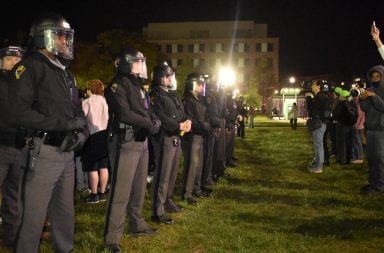
Jill Stein campaigns at Capital University on Sept. 2. Credit: Nick Roll | Campus Editor
For many students at Ohio State, November will mark the first presidential election in which they are eligible to vote. Those unsatisfied with casting their ballot for Republican candidate Donald Trump or Democratic candidate Hillary Clinton have other options.
Jill Stein, representing the Green Party, and Gary Johnson, representing the Libertarian Party, will accompany candidates Trump and Clinton on the ballot in the majority of states, including Ohio.
“I encourage fellow Libertarians, liberals and conservatives to vote their principles rather than their party,” said Jonathan Kubesch, a third-year in evolution and ecology and a Johnson supporter. “When someone tells you you’re wasting your vote, they’re saying your opinion or your conscience doesn’t matter.”
The Green Party’s platform advocates for policies such as a 30-hour work week, free child care, free public health care and, addressing a predominant concern among millennials, free lifelong public education through college and the elimination of existing student debt via federal reserve bailouts.
“Although it seems unreasonable today to have free college tuition, it actually is the most reasonable solution,” said Coco Smith, a third-year in history and the treasurer of the Ohio State branch of the International Socialist Organization, which has endorsed Stein in this election.
Johnson’s platform includes replacing all income and payroll taxes with consumption taxes, term limits for all major government offices and an emphasis on smaller government. It counters Stein on education, saying the general solution to the large amounts of college debt is not in offering free college education, but in restructuring and primarily limiting federal student aid.
“Ultimately, he would leave it to students, shifting to other routes of schooling for certain fields,” Kubesch said. “Skilled trades, community-college-to-university tracks and naturally seeking education outside the ivory tower are other cheap alternatives (to traditional college).”
Among presidential candidates, Johnson especially stands out regarding the minimum wage, calling for its abolition.
“Whenever we install a minimum wage, we are installing a barrier,” Kubesch said. “Unless your labor is worth at least more than the cost of keeping you employed, filling out all the forms necessary to keep you employed, and providing all of your benefits and keeping the business afloat as a whole, the minimum wage prices folks out of work.”
In contrast, the Green Party is campaigning for a “living wage” of $15 per hour, which the Democratic Party adopted on its platform earlier this year, as well as a guaranteed right to work.
In addition to economic issues such as student loan debt and minimum wage, the Libertarian and Green parties also address foreign relations and international peace and security. Stein and Johnson have both publicized their intentions to cut military funding, though to different extents.
“One thing I really admire about Jill Stein’s platform is the unequivocal attitude of preserving peace, pulling out troops from all the military bases we have in almost every country and refusing to meddle in the Middle East to gain oil or profit for the capitalists,” Smith said.
Johnson’s campaign website says he will move “quickly and decisively” to cut military funding, but in times of crisis, “he will only send our brave soldiers to war when clearly authorized by Congress after meaningful, transparent deliberation and debate.”
Earlier this month, Johnson received criticism on his knowledge of foreign affairs for not recognizing the mention of the war-torn city of Aleppo, Syria during a live interview.
“I would expect our presidents to be human,” Kubesch said. “If we can tolerate Gerald Ford falling down the stairs of Air Force One, George H.W. Bush vomiting in the lap of a Japanese ambassador and many of the awkward diplomatic debacles with Barack Obama in his various interactions with other heads of state, then I think we can have an executive who, with the proper supplemental experience, can ask, ‘What is Aleppo?’”
Though the overarching goals of both campaigns is to win the presidency despite their candidates’ relatively low polling numbers, Smith said there are reasons beyond the election to continue canvassing efforts.
“The main thing is to build an alternative option to the Republicans and Democrats — it is not just about winning the election,” Smith said.


